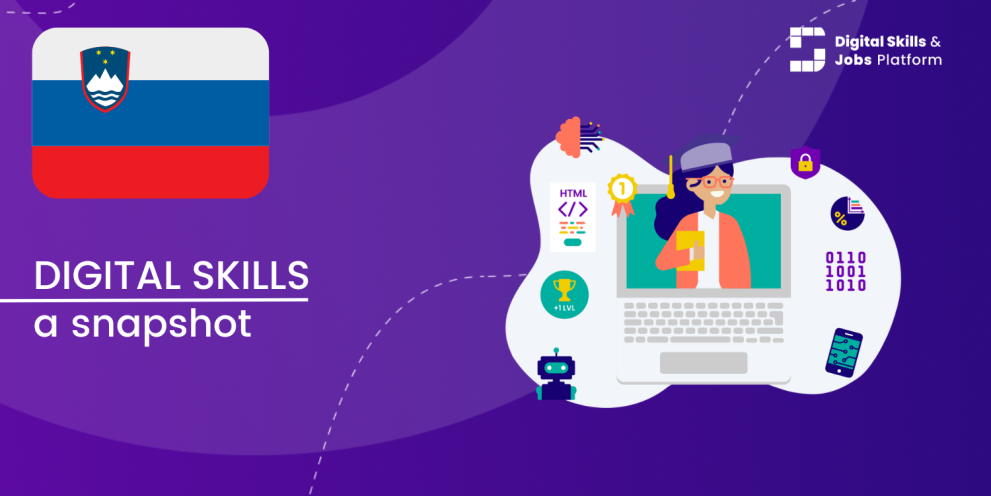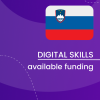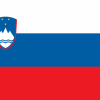Slovenia: a snapshot of digital skills

Introduction
In the 2024 edition of the Digital Decade report, Slovenia has achieved 46.7% basic digital skills coverage, compared to the EU average of 55.6%. The score in Slovakia has decreased compared to 2023 results (49.7%).
According to the Digital Decade report 2024, Slovenia performs below the EU average in both digital skills indicators. The percentage of ICT specialists in employment has decreased from 4.5% in 2023 to 3.8% in 2024 compared to the recent EU average of 4.8%.
In 2022 Microsoft's Digital Futures Index measured the digitalization level of 16 European countries, including Slovenia. The Index brings data about the current level of digitalization of the country and detects the most successful areas, but also the areas where there is more work to be done to accelerate the digital transformation process. Digitalization is perceived through 5 categories of digital development: Digital Business, Digital Government and Public Sector, Digital Infrastructure, Digital Sector, and Human Capital. The overall level of Slovenia’s digital development is 107, which is 7% above the CEE average. Compared to the Central and Eastern European countries, Slovenia is ranked above average in terms of digitalization in general and can compete with some of the most digitally developed European countries in some areas. It records good results in the digitalization of education, human resources, corporate investments in research and development, and the digital competitiveness of companies.
The Slovenian Digital Coalition (Digitalna Slovenija) was established in 2016 as a multi-stakeholder platform coordinated by the Chamber of Commerce and Industry of Slovenia. The Slovenian Digital Coalition is focused on attaining a cross-sector multiplier impact that accelerates the development of the digital society and exploits opportunities for the development of ICT and the internet. aims to strengthen digital skills and increase the digital competences of European society and the workforce. It offers insight into European and national initiatives and actions in the field of digital skills and knowledge, training opportunities and career development support, good practice, expert advice, resources and tools, research-based data, facts and figures, funding opportunities, news, opinions and events.
Overview of state strategies and national initiatives
State strategies
The Strategy of digital transformation of the economy was prepared in 2021 and adopted by the Slovene Government in January 2022. It covers advanced digital technologies, an efficient ecosystem for a competitive economy and a sustainable society as the basis for the growth of a digital economy. The Strategy is focused on three major goals: advanced digital technologies that enable the digital transformation of the economy; efficient ecosystem for a competitive economy; open and sustainable society as a basis for the growth of the digital economy.
The Digital Inclusion Promotion Act was adopted in February 2022 addressing the entire population with the aim of digital empowerment of citizens, through providing financial incentives for the purchase of digital equipment, and contributing to the digitalisation of the school process and to the responsible and safe use of digital technologies.
The National Programme for the Promotion of Development and Use of Artificial Intelligence in the Republic of Slovenia by 2025 aims to provide an open and creative environment to exchange information quickly and efficiently, sharing experiences and best practices and providing a space for research, development, deployment, and testing of AI technologies.
The Digital Public Services Strategy 2021-2030 was adopted in December 2022. It strives towards ensuring data for better services and decision-making and providing a secure, trustworthy and inclusive digital environment.
Digitalna Slovenija 2030, the national strategy for the digital transformation of Slovenia till 2030 was published in March 2023. Horizontal principles of the Strategy are: General awareness of the importance of digital transformation; The Internet as a strategic tool of digital transformation; Protecting the free and open Internet; Pursuit of intersectoral synergistic development effects; Use of the Slovenian language and preservation of cultural identity; Promoting research and development of digital technologies and their use; Strategic autonomy, digital single market and digital sovereignty; Democratic digital society and achieving Slovenia's development goals through digital transformation.
Since 2021 Slovenia have The Ministry of Digital Transformation which monitors and analyses the state of digital transformation and the information society at the national level. It is responsible for the areas of the information society, electronic communications, digital inclusion, digital competences, the data economy, management of information and communication systems, and the provision of electronic public administration services. In cooperation with the competent ministries and government offices, the Ministry prepares, coordinates and implements national measures and projects in the field of the information society and digital transformation of the economy, public administration, healthcare, justice, agriculture, education and other areas.
National initiatives
The Slovenian Recovery and Resilience Plan contribute to the digital transformation of Slovenia’s society and economy with 21.4% of the plan’s total allocation. supports the digital transition with reforms in the digitalisation of the public administration, in skills and cyber security. A strategy for digital transformation and reforms on electronic identification aims to increase use of public e-services and digitalisation of companies.
Digital transformation of the economy (business and industry) is supported by the adoption of the Strategy for the Digital Transformation of Enterprises, guidelines for innovative procurement, and the operationalisation of a single digital identity (e-identity) for companies. The Strategy provides for the transfer of different registers to one single business register. In accordance with the Strategy, at least 200 businesses shall acquire an e-identity.
Strengthening digital transformation of public administration aims to improve the governance of digital transformation in public administration. This will be achieved through the adoption of a Digital Public Services Strategy 2021-2030 and the establishment of an Informatics Development Council as a coordinating body of digital solutions. The Informatics Development Council was set up in February 2022. It functions as a management body, coordinating operations related to IT investment in the public sector, to its standards, the back-office systems and other technological developments where the compatibility of the systems is essential for their operation and maintenance. The Digital Public Services Strategy 2021-2030 was adopted in December 2022. It strives towards ensuring data for better services and decision-making and providing a secure, trustworthy and inclusive digital environment.
Female Engineer of the Year is an award for inspiring young girls to choose engineering careers. The award addresses the problem of the "invisibility" of female engineers in society. Its goal is to provide role models for young girls and highlight work achievements and contributions to the society of Slovenian female engineers. With the Engineer of the Year selection, Slovenia presents 10 interesting female engineers to the public every year, with their personalities and work, can encourage, inspire or encourage young people to decide on an engineering study or career path. The project is inspiring young females for engineering, technology, natural sciences and innovation since 2012.
E-content and e-services to support the introduction of new approaches in education is a new project adopted in May 2022. It aims to facilitate Slovenia’s transition to digital education. With a contribution from the European Regional Development Fund, the project will promote greater use of modern ICT in teaching and learning. As part of the project, the Ministry of Education, Science and Sport, the Academic and Research Network of Slovenia (ARNES) and the Institute of Information Science will provide a comprehensive upgrade of both: (i) existing educational e-services and e-content; as well as (ii) the current support system for both pupils and teachers in primary and secondary schools. This upgrade will be carried out in the period 2021-2023. The project will help to improve: (i) learning processes based on the use of innovative approaches; (ii) the skills of young people through greater use of modern ICT in teaching and learning; and (iii) the skills of educators through greater use of modern ICT in teaching and learning.
Funding opportunities
Funding opportunities for upskilling and reskilling to support the digital competences of individuals and organizations are available in form of loans, grants and financial instruments. For the period 2021 – 2026, most of the activities in digital transformation are financed through Recovery and Resilience facility but also as activities in Horizon, Erasmus+, ESIF and EEA grant schemes. You may find more on the page of the Slovenian National Digital Skills and Jobs Coalition and in the article on the Digital Skills and Jobs Platform.






